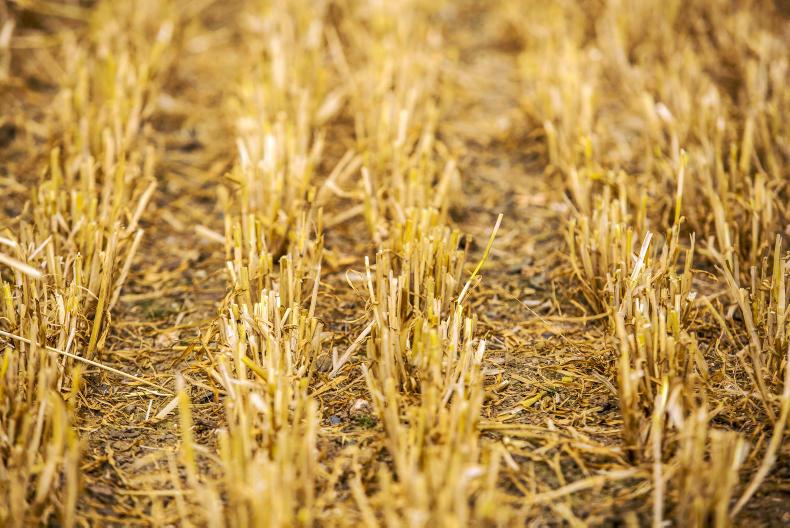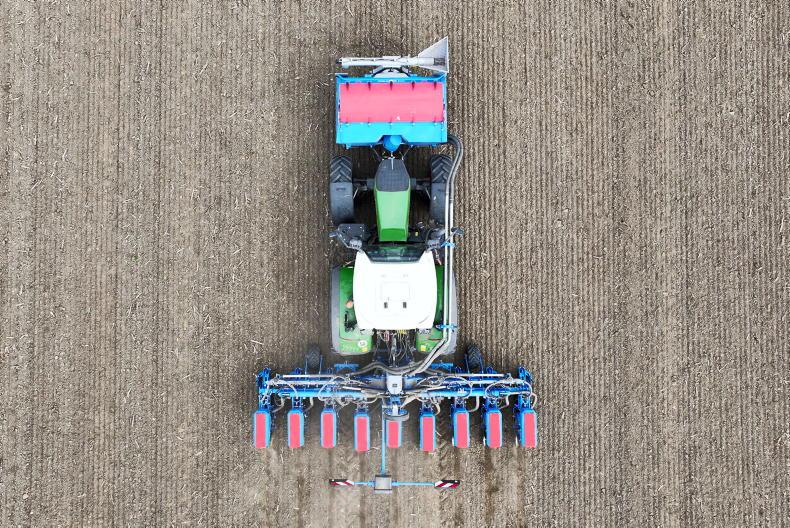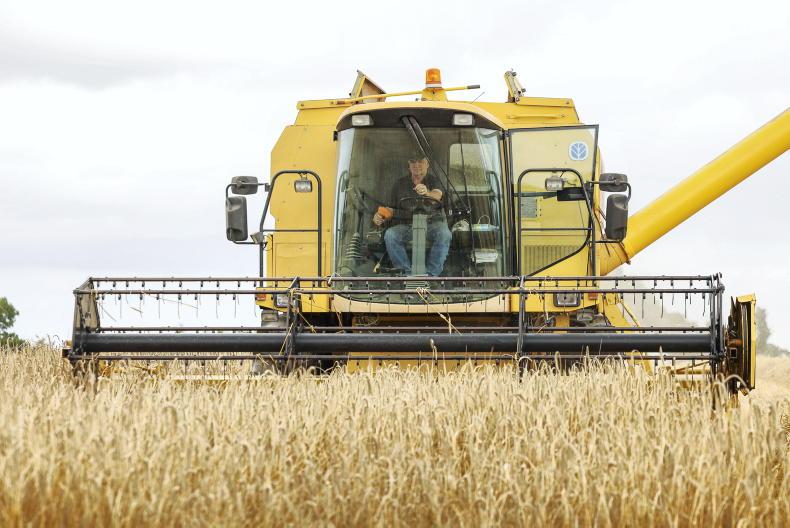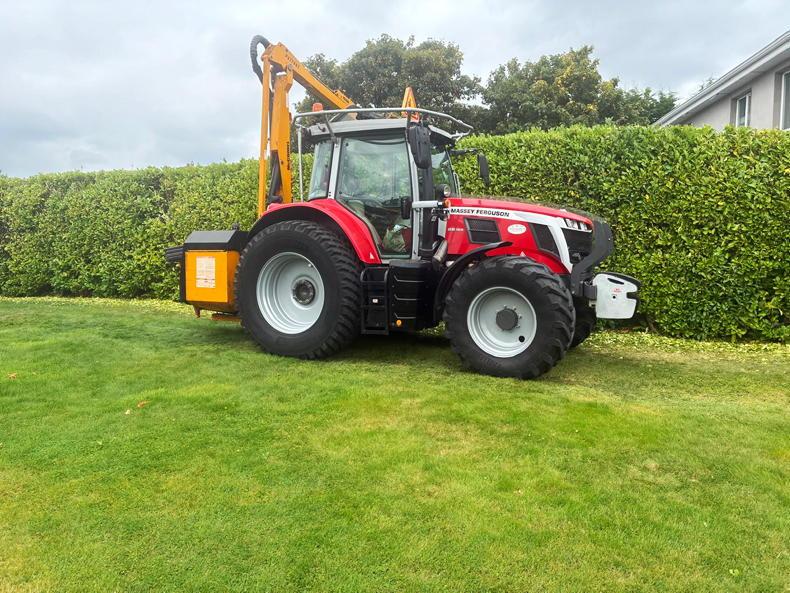This week, we revisit growers from Meath, Cork and Derry. Harvest 2018 has begun in all parts of the country although southern crops are much further ahead. The focus shifts to spring barley in the south, wheat in the east and winter oilseed rape in the north.


Clonee, Co Meath
Things have remained dry in Clonee over the last few weeks with rainfall amounts totalling around 6mm.
“We got virtually nothing here compared to parts of the south of west,” explains Martin. His meadows are just beginning to green up after the first cut of hay two months ago. He spread 100kg/ha of 27% N on his grassland last week in expectation of the rain.
Martin’s harvest began last Sunday with his winter oilseed rape. The crop did well, averaging close to 1.9t/ac. Moistures were low, at around 9.5%. Martin sowed the hybrid rape variety PT256 at 1.8kg/ha but also sowed the crop with 3kg/ha of white clover. The clover was killed off using a combination of selective herbicides earlier in the year. Martin believes the clover has had some form of positive yield effect on the crop. The oilseed rape was desiccated three weeks ago and a pod sticker was applied. As a result, the harvest went smoothly with his Claas Lexion 750 with 24ft header. He averaged 2.7 8x4x4 oilseed bales/acre.
Winter wheat performing well
Martin cut his Graham winter wheat earlier this week. His crops were grown on both fresh and old ground. Crops grown on fresh ground yielded 4.7t/ac at 15% moisture with 79.6 KHP. He averaged 5.8 of his big square bales/acre.
Crops on old ground averaged 4.5t/ac at 16% moistures with specific weights of 76 KPH. His Costello winter wheat has so far averaged around 4.05t/ac at 15% moisture with specific weight at 76 KPH. His wheat harvest is around two to two-and-a-half weeks early this year.
His spring beans are turning now and Martin thinks that they could be harvested at the start of September. “The beans won’t be a disaster,” he explains. His spring barley remains around two weeks from harvest.
As soon as fields are cleared they will be cultivated with his Horsch Tiger cultivator. The fields will then be rolled and weed seeds allowed to germinate. Martin will then burn off volunteers and he expects to sow winter oilseed rape by 20 August.
“The forecast is for some rain which would be welcome, so long as it remembers when to stop.”


Stephen harvesting JB Diego wheat at 18% last weekend with bushels ranging from 76-78KPH.
Mogeely, Co Cork
After a good run of weather in Mogeely, the harvest is progressing well. Around 30mm of rain fell over the past four months, which has been welcomed.
When talking with Stephen last month, he was close to finishing his winter barley. The crop yielded well, ranging between 3.3-4.0 t/ac. His Kosmos winter barley was his highest-yielding variety, averaging 4.0t/ac.
His winter oilseed rape harvest started on July 19 and finished a week later. The crops yielded between 1.3t/ac and 1.8t/ac at low moisture depending on field and variety. The lowest yielding crop was as a result of extensive lodging, which may have been a result of high branching.
He cut most of his winter wheat earlier in the week and was happy with his yields, between 4.0-4.25 t/ac. Specific weights ranged from 76-78KPH at around 18%. Straw yields were down slightly at around 10 4x4 round bales/acre.
Spring barley harvest begins
Stephen began cutting his spring malting barley last Friday, which is early. So far his Planet barley yielded between 2.5-3.0t/ac at between 17-19% moisture.
Specific weights were between 64-68KPH and Stephen was happy with the quality of the sample. It has all passed for malting so far.
Screenings didn’t appear to be that much of a problem when the crop went through the combine.
“The grain looked better in the trailer than it did when it was standing in the field,” explains Stephen. Initial spring barley straw yields are down slightly at around eight bales/acre.
“Straw was baled with no hassle, which may be worth a bale to the acre in itself.” Stephen is pleased with his spring wheat and it appears to have escaped the worst of the drought.
The rain has reenergised his beet and growth has once again taken off. The Silver Y Moth caterpillar is present in the crop but is not very damaging just yet. The crop is due to receive Opera and Bortrac this week and Stephen may apply an insecticide for the caterpillar.
“This harvest has been progressing well with the good weather. Hopefully this keeps up.”


Richard drying winter barley which was harvested last week at 20%-21% moisture content.
Limavady , Co Derry
The uninterrupted fine weather over the past number of months is all but a memory in the northwestern corner of the country, as broken weather once again returned just as harvest 2018 commenced.
That said, the harvest is still slightly early and ground conditions remain excellent.
Richard cut his winter barley last week. His crop of Infinity barley has been mixed all year and it was no surprise to Richard that yields were variable.
The best of the crops managed 3.5t/ac. Grain moistures came in at 20% to 21%.
The sample looked clean as it entered the grain tank of his Claas Lexion 660 with its 22ft head.
The crop was burned off three weeks ago and, as a result, the straw was dead and yielded well.
He moved on to his winter oilseed rape shortly after. The crop was burned off a number of weeks ago with glyphosate at 2.0l/ha.
The crop yielded around 1.75t/ac at 13% moisture. He plans to bale the oilseed straw this year.
Grain drying begins
Drying of winter barley and oilseed rape has begun. Richard dries oilseed rape for himself and a number of customers on contract and then stores it.
He uses an Opico 12t automatic batch dryer for oilseed rape.
His barley is dried using an 800t underfloor dryer with an overground stirring system. He dries the grain down to 15% moisture content.
Earlier this week, he cut 15 acres of winter wheat for crimping at 30% moisture content. The straw is surprisingly dead and was baled a couple of days after cutting. The straw only needed to be turned once. He won’t burn off the remainder of his feed wheat crops, as they are coming in quick.
His Graham seed crop will be harvested next week. Richard grows, cleans, treats and certifies seed.
His spring barley still looks well, but around 20% of it is lodged due to heavy rain last week. It’s still three to four weeks away from harvest. His spring oilseed rape and spring wheat crops remain full of potential and are still green.
“There’s high demand for straw. The good prices aren’t putting customers off buying,” he said.
Read more
From the tramlines: countdown on to spring harvest
Harvest18: weekend rain halts harvest progress
This week, we revisit growers from Meath, Cork and Derry. Harvest 2018 has begun in all parts of the country although southern crops are much further ahead. The focus shifts to spring barley in the south, wheat in the east and winter oilseed rape in the north.


Clonee, Co Meath
Things have remained dry in Clonee over the last few weeks with rainfall amounts totalling around 6mm.
“We got virtually nothing here compared to parts of the south of west,” explains Martin. His meadows are just beginning to green up after the first cut of hay two months ago. He spread 100kg/ha of 27% N on his grassland last week in expectation of the rain.
Martin’s harvest began last Sunday with his winter oilseed rape. The crop did well, averaging close to 1.9t/ac. Moistures were low, at around 9.5%. Martin sowed the hybrid rape variety PT256 at 1.8kg/ha but also sowed the crop with 3kg/ha of white clover. The clover was killed off using a combination of selective herbicides earlier in the year. Martin believes the clover has had some form of positive yield effect on the crop. The oilseed rape was desiccated three weeks ago and a pod sticker was applied. As a result, the harvest went smoothly with his Claas Lexion 750 with 24ft header. He averaged 2.7 8x4x4 oilseed bales/acre.
Winter wheat performing well
Martin cut his Graham winter wheat earlier this week. His crops were grown on both fresh and old ground. Crops grown on fresh ground yielded 4.7t/ac at 15% moisture with 79.6 KHP. He averaged 5.8 of his big square bales/acre.
Crops on old ground averaged 4.5t/ac at 16% moistures with specific weights of 76 KPH. His Costello winter wheat has so far averaged around 4.05t/ac at 15% moisture with specific weight at 76 KPH. His wheat harvest is around two to two-and-a-half weeks early this year.
His spring beans are turning now and Martin thinks that they could be harvested at the start of September. “The beans won’t be a disaster,” he explains. His spring barley remains around two weeks from harvest.
As soon as fields are cleared they will be cultivated with his Horsch Tiger cultivator. The fields will then be rolled and weed seeds allowed to germinate. Martin will then burn off volunteers and he expects to sow winter oilseed rape by 20 August.
“The forecast is for some rain which would be welcome, so long as it remembers when to stop.”


Stephen harvesting JB Diego wheat at 18% last weekend with bushels ranging from 76-78KPH.
Mogeely, Co Cork
After a good run of weather in Mogeely, the harvest is progressing well. Around 30mm of rain fell over the past four months, which has been welcomed.
When talking with Stephen last month, he was close to finishing his winter barley. The crop yielded well, ranging between 3.3-4.0 t/ac. His Kosmos winter barley was his highest-yielding variety, averaging 4.0t/ac.
His winter oilseed rape harvest started on July 19 and finished a week later. The crops yielded between 1.3t/ac and 1.8t/ac at low moisture depending on field and variety. The lowest yielding crop was as a result of extensive lodging, which may have been a result of high branching.
He cut most of his winter wheat earlier in the week and was happy with his yields, between 4.0-4.25 t/ac. Specific weights ranged from 76-78KPH at around 18%. Straw yields were down slightly at around 10 4x4 round bales/acre.
Spring barley harvest begins
Stephen began cutting his spring malting barley last Friday, which is early. So far his Planet barley yielded between 2.5-3.0t/ac at between 17-19% moisture.
Specific weights were between 64-68KPH and Stephen was happy with the quality of the sample. It has all passed for malting so far.
Screenings didn’t appear to be that much of a problem when the crop went through the combine.
“The grain looked better in the trailer than it did when it was standing in the field,” explains Stephen. Initial spring barley straw yields are down slightly at around eight bales/acre.
“Straw was baled with no hassle, which may be worth a bale to the acre in itself.” Stephen is pleased with his spring wheat and it appears to have escaped the worst of the drought.
The rain has reenergised his beet and growth has once again taken off. The Silver Y Moth caterpillar is present in the crop but is not very damaging just yet. The crop is due to receive Opera and Bortrac this week and Stephen may apply an insecticide for the caterpillar.
“This harvest has been progressing well with the good weather. Hopefully this keeps up.”


Richard drying winter barley which was harvested last week at 20%-21% moisture content.
Limavady , Co Derry
The uninterrupted fine weather over the past number of months is all but a memory in the northwestern corner of the country, as broken weather once again returned just as harvest 2018 commenced.
That said, the harvest is still slightly early and ground conditions remain excellent.
Richard cut his winter barley last week. His crop of Infinity barley has been mixed all year and it was no surprise to Richard that yields were variable.
The best of the crops managed 3.5t/ac. Grain moistures came in at 20% to 21%.
The sample looked clean as it entered the grain tank of his Claas Lexion 660 with its 22ft head.
The crop was burned off three weeks ago and, as a result, the straw was dead and yielded well.
He moved on to his winter oilseed rape shortly after. The crop was burned off a number of weeks ago with glyphosate at 2.0l/ha.
The crop yielded around 1.75t/ac at 13% moisture. He plans to bale the oilseed straw this year.
Grain drying begins
Drying of winter barley and oilseed rape has begun. Richard dries oilseed rape for himself and a number of customers on contract and then stores it.
He uses an Opico 12t automatic batch dryer for oilseed rape.
His barley is dried using an 800t underfloor dryer with an overground stirring system. He dries the grain down to 15% moisture content.
Earlier this week, he cut 15 acres of winter wheat for crimping at 30% moisture content. The straw is surprisingly dead and was baled a couple of days after cutting. The straw only needed to be turned once. He won’t burn off the remainder of his feed wheat crops, as they are coming in quick.
His Graham seed crop will be harvested next week. Richard grows, cleans, treats and certifies seed.
His spring barley still looks well, but around 20% of it is lodged due to heavy rain last week. It’s still three to four weeks away from harvest. His spring oilseed rape and spring wheat crops remain full of potential and are still green.
“There’s high demand for straw. The good prices aren’t putting customers off buying,” he said.
Read more
From the tramlines: countdown on to spring harvest
Harvest18: weekend rain halts harvest progress
















SHARING OPTIONS